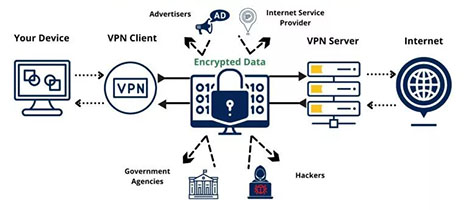Keep reading for a crash course on Virtual Private Networks (VPNs).

VPN stands for “virtual private network,” a method of secure communications that protects your connection while you’re using the internet. It makes your browsing private, hides your IP (Internet Protocol) address, and ensures your internet service provider (ISP) doesn’t track you.
To accomlish this, a VPN reroutes your traffic to a special server, making all your online activities invisible. Browse worry-free. No more spies decoding your browsing habits or anything else you do online.
Websites and your ISP (Internet Service Provider) won’t see your web activities. The VPN reroutes all your internet traffic through a remote VPN server. How? A VPN creates a virtual connection between your device and the internet. It then sends all your online data through an secure and encrypted tunnel.
Your IP is a unique string of numbers assigned to your device when you connect to the internet.
Your ISP can use your IP to track all your browsing activity. Some governments can even legally monitor your digital location. If you want this to stop, you need to mask your real IP to remain anonymous.
Your current IP Address is: 216.73.216.15
Many ISPs and companies sell your data to advertisers or marketers. It is an easy way for them to make money.
If you connect to a VPN, your online privacy stays protected. You’ll have a safer online journey knowing all prying eyes are kept at bay. No one can see what you are doing.
VPNs eliminate your risk of exposing your personal information to cybercriminals.
This is essential when using unsecured public Wi-Fi networks. If you are at a café, hotel, or airport using a public Wi-Fi connection, you want to be careful. Having an active VPN on your device protects your valuable information from 'man-in-the-middle attacks’, identity theft, or data breaches.
Everyone should have open and free internet access and access to online shopping websites. In reality, the internet has its borders.
If you are visiting a country in Europe, you might be restricted from accessing US-based websites or online platforms, including online news publications, banks and online shopping websites. With a VPN, you can bypass geo-content restrictions and gain access to all your favorite websites.
You leave trails during each browsing session. The websites you visit, the photos you upload, and your social media interactions are your web crumbs.
This digital footprint is shared and sold between marketers and data brokers, leaving you vulnerable to data breaches. Websites can’t trace you when you connect through a VPN.
If privacy is important to you, you should use a VPN every time you connect to the internet.
Exploring the world doesn’t mean you have to change the way you use the internet. A VPN lets you use the internet as if you were still in your home country, no matter how far you travel.
Using a VPN lets you watch movies and TV on streaming services like Netflix, Hulu, Amazon, and HBO with freedom from ISP throttling or blocking by your ISP or local Wi-Fi network.
Connecting to public Wi-Fi hotspots like those in cafes, airports, and parks could leave your private information vulnerable. Using a VPN on your devices keeps you safe with strong encryption.
Using a VPN unlocks games, maps, skins, and other add-ons that might be restricted on your network. It also shields you from DDoS attacks and reduces ping and overall lag.
P2P file sharing usually means that strangers can see your IP address and possibly track your downloads. A VPN keeps your IP address private, letting you download with increased anonymity.
Some online stores show different prices to people in different countries. With a VPN, you can find the best deals in the world no matter where you’re shopping from.